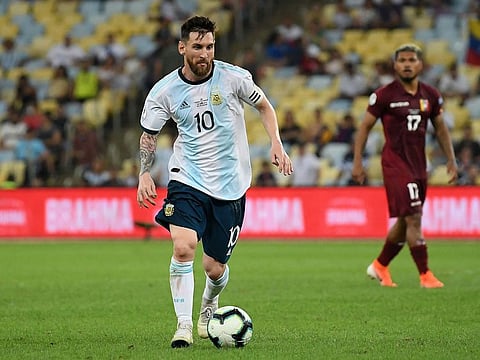World Cup Qatar was a reminder of why football matters
It is about winning a match or a tournament but ultimately it is about something bigger

My friend is not an elitist. To the contrary, he has spent decades of his life fighting social inequality, racism and championing the rights of disadvantaged groups.
Therefore, I was taken aback when he surmised that “football is the opium of the people”.
In the Fifa World Cup 2022, held in Doha, Qatar, the viewership is predicted to be over five billion people, according to NBC Sports estimations.
The last summer Olympics held in Tokyo were watched by an equally impressive number: over 3 billion people, according to the International Olympic Committee.
When half of humanity tunes in to follow an event, any event, this will naturally attract the attention of big corporations, especially those who produce consumer products and, of course, politicians.
Indeed, football often unites us beyond class, religion and race, a near impossibility in today’s fractious politics everywhere in the world.
Sports arenas as contested spaces
Sports arenas are contested spaces. They are not owned by a government, a company or a famous publication. The latter are all, of course, keen on controlling the meanings, presentations and, if they can, the results as well, of major sports events.
But they cannot, simply because the spectators are always resisting, championing their own meaning of sports, and fighting back to reclaim these spaces in ways that accurately represent their communities and their nations — thus, their own popular aspirations.
This is why we loved Morocco’s unprecedented achievements at the World Cup. One would venture to claim that no other team in football history has carried such layers of meanings as Morocco has.
The very choice of words the media used to illustrate Morocco’s achievement was itself telling of a bigger story: the First Arab and African country to ever reach the World Cup semi-finals.
The fact that we chose to highlight these specific indicators, not others, spoke a great deal about the current inequality that exists, not only in sports, but in the world at large.
Then follow the numerous sub-meanings: the fact that the legendary Moroccan goalkeeper, Yassine Bounou, insisted on speaking in his Arabic mother tongue at the press conference following his country’s win over Portugal on December 10, even though he speaks several other European languages.
Additionally, the fact that players kneeled down to pray after each game, thus illustrating their Muslim identity, were all significant examples; let alone the emphasis on Arab unity throughout the entire competition, an effort that was championed by millions of ordinary spectators and backed by the players.
This is only a small part of the story. Every team, from Japan, to Saudi Arabia to Senegal represented something, carrying popular and cultural messages. Not even mainstream media could easily ignore this.
Though other sports can serve as a space for ordinary people to communicate their collective solidarity or aspirations, football is unique in this way. Unlike tennis, golf or gymnastics, for example, football is far more accessible, and does not fall into socioeconomic spaces that are only available to middle or upper classes.
Football is the sport of the poor, whose idols, the likes of Pelé, Maradona and Ronaldo — now Hakimi, Salah and Ziyech — were brought up in struggling, working-class communities.
The fight for ownership over the meaning of football will continue, long after the World Cup is folded, at every stage and in every neighbourhood, from Nairobi to Rabat to Brasilia. Yes, football is about winning a match or a tournament but, ultimately, it is about something bigger — unity, hope, social conflicts and, yes, popular resistance.
Even if, at times, we seem oblivious to these subtle meanings, they will always, always be there.
Ramzy Baroud is a journalist, author and editor. He is the author of six books.
Sign up for the Daily Briefing
Get the latest news and updates straight to your inbox



